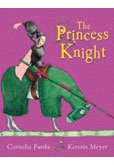Old Wine in a New Flask
I stopped by my local elementary school book fair this morning and noticed a few titles I thought I might mention. This was the second book fair I've attended in three days. You know I can't be around that many books in that short a space of time without finding something to complain about, so I'm going to do the complaining today and get it over with.

I thumbed through The Princess Knight by Cornelia Funke and was a little surprised by what I saw. The book seems to be both didactic and dated. It's a motherless-girl-raised-as-a-tomboy-then-forced-to-become-girlie-in-adolescence story with a very 1970's kind of feminist ending. The main character is the youngest child and only daughter of a king who has a number of sons. Her mother dies at her birth, a very traditional way of getting rid of moms in nineteenth century children's stories. (Why is Mom always dead in stereotypical tomboy stories? Is Mom the great enforcer of female roles?) Dad then raises the young princess like his sons, teaching her how to ride a horse, fight, etc. But once she reaches adolescence, he wants her to suddenly become the conforming princess who gives her hand in marriage to the knight who wins a tournament. (I'm guessing a sociologist/anthropologist/psychiatrist/somebody could give us a little talk about this preadolescent character--having little in the way of outward sexual characteristics to define her gender--being allowed freedom, which she has to sacifice during the transitional period between childhood and adulthood when she physically becomes girlie so that she can take her place in the adult scheme of things.) The teenage princess disguises herself as a knight to take part in the tournament where she beats all the other knights so that she doesn't have to marry any of them. Then, for some reason that remains a mystery to me, she takes off for a while. When she comes home, she marries the gardener's son. So there's a lesson here about sexual and social equality. A twofer!
You can't miss the gender lesson because it is not subtle by any means. I also think it's a dated lesson because while I would never claim that sexual discrimination no longer exists, it is no longer of the you-can't-be-a-knight-because-you're-a-girl variety. It's more of a we'll-let-you-be-a-knight-if-you-work-harder-than-we-do-and-prove-yourself-in-ways-we-guys-don't-have-to kind of thing. Though Funke is supposed to be living in California now, this book may have been written in German originally and would thus reflect a German sensibility. Maybe the social order is different there. But in the U.S., it's now the twenty-first century. Physical education classes in public schools are coeducational. Boys and girls learn the same things. Municipal recreational sports leagues, though they may be made up primarily of boys, are open to girls. Martial arts classes--open to girls and everyone trains together learning the same things. A number of state universities use the slogan: "Where men are men and women are champions" because of their winning women's sports teams. Women are fighting a war side by side with men. (Yeah, yeah, yeah. I know the military is supposed to be sexist as all get out. But that doesn't change the fact that women are there.) While I think it's unlikely we'll have two women heading the party tickets in the next presidential race, people are talking about the possibility that Hillary Clinton will go up against Condoleeza Rice.
The world children live in today is not one where girls are overtly told that they can't do things. I imagine a preschool class hearing this story and going "What do you mean her father didn't want her taking part in the tournament?" I also imagine adults really admiring this book because it hits kids over the head with a lesson many of us like. I just don't think it's necessary to preach to the child choir.
We need a new story model for children who do the unexpected. Instead of children fighting the establishment so that they can be free to be who they are, I'd like to see stories about children just going out and being who they are. Let's actually show children gender equality instead of telling them about it through improving lessons.
For a better liberated princess story, try The Paper Bag Princess by Robert Munsch.
No comments:
Post a Comment